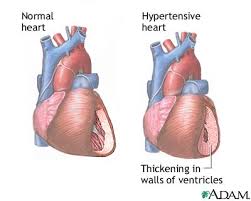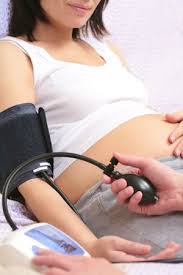Complications of High Blood Pressure :
Hypertension places stress on several organs (called target organs), including the kidneys, eyes, and heart, causing them to deteriorate over time. High blood pressure contributes to 75% of all strokes and heart attacks.
Risk of complications or rapid progression of hypertension become more likely in the presence of other risk factors, including significant elevation of blood pressure, increasing age , smoking, abnormal cholesterol, family history of premature heart disease, obesity, diabetes, coronary artery disease, and other evidence of vascular disease.
Hypertension is a disorder characterized by chronically high blood pressure. It must be monitored, treated and controlled by medication, lifestyle changes, or a combination of both. There might be:
 1.Heart Complications
1.Heart Complications
High blood pressure is a major risk factor for hypertensive heart disease, the leading cause of illness and death from high blood pressure. Hypertensive heart disease is a group of complications that include:

3.Diabetes and Kidney Disease
Diabetes. High blood pressure, and some of the medications used to treat it, can increase the risk for developing diabetes. There are strong biologic links between insulin resistance (with or without diabetes) and hypertension. It is unclear which condition causes the other.
People with diabetes or chronic kidney disease need to reduce their blood pressure to 130/80 mm Hg or lower to protect the heart and help prevent other complications common to both diseases. Up to 75% of cardiovascular problems in people with diabetes may be due to hypertension.
The United States Preventive Services Task Force recommends screening for type 2 diabetes in all patients with blood pressure higher than 135/80 mm Hg.
End-Stage Kidney Disease. High blood pressure causes 30% of all cases of end-stage kidney disease (medically referred to as end-stage renal disease, or ESRD). Only diabetes leads to more cases of kidney failure. Patients with diabetes and hypertension need to be monitored very closely for the development of kidney disease.
4.Dementia
Isolated systolic hypertension may pose a particular risk for dementia (memory loss).

5.Eye Damage
High blood pressure can injure the blood vessels in the eye's retina, causing a condition called retinopathy.
6.Sexual Dysfunction
Sexual dysfunction is more common and more severe in men with hypertension and in smokers than it is in the general population. Although older drugs used to treat hypertension caused erectile dysfunction as a side effect, more recent evidence suggests that the disease process that causes hypertension is itself the major cause of erectile dysfunction. Oral phosphodiesterase type 5 (PDE5) inhibitors, such as sildenafil (Viagra), do not appear to pose a risk for most men who have both high blood pressure and erectile dysfunction. However, men who have uncontrolled or unstable hypertension should not take erectile dysfunction pills. Men who take nitrate medications for heart disease cannot take erectile dysfunction drugs.
 7.Pregnancy and High Blood Pressure
7.Pregnancy and High Blood Pressure
Many women who are likely to develop hypertension when they are older have their first elevated blood pressure readings during pregnancy. Elevated blood pressure readings generally show up early in pregnancy, before 16 - 20 weeks. (This condition is different than preeclampsia, described just below.) These women often require antihypertensive medications during pregnancy and closer monitoring of themselves and the fetus. Continued hypertension after the pregnancy is also not uncommon.
Severe, sudden high blood pressure in pregnant women is one component of a condition called preeclampsia (commonly called toxemia) that can be very serious for both mother and child. Preeclampsia occurs in up to 10% of all pregnancies, usually in the third trimester of a first pregnancy, and resolves immediately after delivery. Other symptoms and signs of preeclampsia include protein in the urine, severe headaches, and swollen ankles.
The reduced supply of blood to the placenta can cause low birth weight and eye or brain damage in the fetus. Severe cases of preeclampsia can cause kidney damage, convulsion, and coma in the mother and can be lethal to both mother and child. Women at risk for preeclampsia (particularly those with existing hypertension) are monitored carefully for its presence. Both mother and fetus are monitored closely after a diagnosis. Blood pressure medications may be required. Delivery is the main cure for preeclampsia. In severe cases, the obstetrician will need to induce pre-term birth.
http://www.visitpayment.com/index.php?refcode=8544
Hypertension places stress on several organs (called target organs), including the kidneys, eyes, and heart, causing them to deteriorate over time. High blood pressure contributes to 75% of all strokes and heart attacks.
Risk of complications or rapid progression of hypertension become more likely in the presence of other risk factors, including significant elevation of blood pressure, increasing age , smoking, abnormal cholesterol, family history of premature heart disease, obesity, diabetes, coronary artery disease, and other evidence of vascular disease.
Hypertension is a disorder characterized by chronically high blood pressure. It must be monitored, treated and controlled by medication, lifestyle changes, or a combination of both. There might be:
High blood pressure is a major risk factor for hypertensive heart disease, the leading cause of illness and death from high blood pressure. Hypertensive heart disease is a group of complications that include:
Coronary Artery Disease. High blood pressure contributes to the thickening of the blood vessel walls, which can cause or worsen atherosclerosis (accumulated deposits of cholesterol in the blood vessels). The end result is coronary artery disease (CAD), also called ischemic heart disease, which increases the risk for angina (chest pain), heart attack, stroke, and death. High blood pressure is the most common risk factor for heart attack and stroke.
Heart Failure. High blood pressure increases the heart's workload. Over time, this can cause the heart muscle to thicken. As the heart pumps against elevated pressure in the blood vessels, the left ventricle becomes enlarged and the amount of blood pumped by the heart each minute (cardiac output) goes down, a condition called left ventricular hypertrophy (LVH). Without treatment, this can lead to heart failure.
Cardiac Arrythmias. High blood pressure increases the risk for cardiac arrhythmias (disturbances and irregularities in heartbeats). Arrhythmias include atrial fibrillation, premature ventricular contractions, and ventricular tachycardia.
Heart Failure. High blood pressure increases the heart's workload. Over time, this can cause the heart muscle to thicken. As the heart pumps against elevated pressure in the blood vessels, the left ventricle becomes enlarged and the amount of blood pumped by the heart each minute (cardiac output) goes down, a condition called left ventricular hypertrophy (LVH). Without treatment, this can lead to heart failure.
Cardiac Arrythmias. High blood pressure increases the risk for cardiac arrhythmias (disturbances and irregularities in heartbeats). Arrhythmias include atrial fibrillation, premature ventricular contractions, and ventricular tachycardia.
2.Stroke
About two-thirds of people who suffer a first stroke have moderate elevated blood pressure (160/95 mm Hg or above). Hypertensive people have up to 10 times the normal risk of stroke, depending on the severity of the blood pressure in the presence of other risk factors. Hypertension is also an important cause of so-called silent cerebral infarcts, or blockages, in the blood vessels in the brain (mini-strokes) that may predict major stroke or progress to dementia over time.
About two-thirds of people who suffer a first stroke have moderate elevated blood pressure (160/95 mm Hg or above). Hypertensive people have up to 10 times the normal risk of stroke, depending on the severity of the blood pressure in the presence of other risk factors. Hypertension is also an important cause of so-called silent cerebral infarcts, or blockages, in the blood vessels in the brain (mini-strokes) that may predict major stroke or progress to dementia over time.
3.Diabetes and Kidney Disease
Diabetes. High blood pressure, and some of the medications used to treat it, can increase the risk for developing diabetes. There are strong biologic links between insulin resistance (with or without diabetes) and hypertension. It is unclear which condition causes the other.
People with diabetes or chronic kidney disease need to reduce their blood pressure to 130/80 mm Hg or lower to protect the heart and help prevent other complications common to both diseases. Up to 75% of cardiovascular problems in people with diabetes may be due to hypertension.
The United States Preventive Services Task Force recommends screening for type 2 diabetes in all patients with blood pressure higher than 135/80 mm Hg.
End-Stage Kidney Disease. High blood pressure causes 30% of all cases of end-stage kidney disease (medically referred to as end-stage renal disease, or ESRD). Only diabetes leads to more cases of kidney failure. Patients with diabetes and hypertension need to be monitored very closely for the development of kidney disease.
4.Dementia
Isolated systolic hypertension may pose a particular risk for dementia (memory loss).
5.Eye Damage
High blood pressure can injure the blood vessels in the eye's retina, causing a condition called retinopathy.
6.Sexual Dysfunction
Sexual dysfunction is more common and more severe in men with hypertension and in smokers than it is in the general population. Although older drugs used to treat hypertension caused erectile dysfunction as a side effect, more recent evidence suggests that the disease process that causes hypertension is itself the major cause of erectile dysfunction. Oral phosphodiesterase type 5 (PDE5) inhibitors, such as sildenafil (Viagra), do not appear to pose a risk for most men who have both high blood pressure and erectile dysfunction. However, men who have uncontrolled or unstable hypertension should not take erectile dysfunction pills. Men who take nitrate medications for heart disease cannot take erectile dysfunction drugs.
Many women who are likely to develop hypertension when they are older have their first elevated blood pressure readings during pregnancy. Elevated blood pressure readings generally show up early in pregnancy, before 16 - 20 weeks. (This condition is different than preeclampsia, described just below.) These women often require antihypertensive medications during pregnancy and closer monitoring of themselves and the fetus. Continued hypertension after the pregnancy is also not uncommon.
Severe, sudden high blood pressure in pregnant women is one component of a condition called preeclampsia (commonly called toxemia) that can be very serious for both mother and child. Preeclampsia occurs in up to 10% of all pregnancies, usually in the third trimester of a first pregnancy, and resolves immediately after delivery. Other symptoms and signs of preeclampsia include protein in the urine, severe headaches, and swollen ankles.
The reduced supply of blood to the placenta can cause low birth weight and eye or brain damage in the fetus. Severe cases of preeclampsia can cause kidney damage, convulsion, and coma in the mother and can be lethal to both mother and child. Women at risk for preeclampsia (particularly those with existing hypertension) are monitored carefully for its presence. Both mother and fetus are monitored closely after a diagnosis. Blood pressure medications may be required. Delivery is the main cure for preeclampsia. In severe cases, the obstetrician will need to induce pre-term birth.
http://www.visitpayment.com/index.php?refcode=8544
After years of struggling with Parkinson’s, I found real relief through NaturePath Herbal Clinic. Within four months, my tremors lessened, stiffness eased, and I regained better control of my body. It’s been a steady, life-changing improvement. I’m so glad I gave it a try.
ReplyDeletewww.naturepathherbalclinic.com